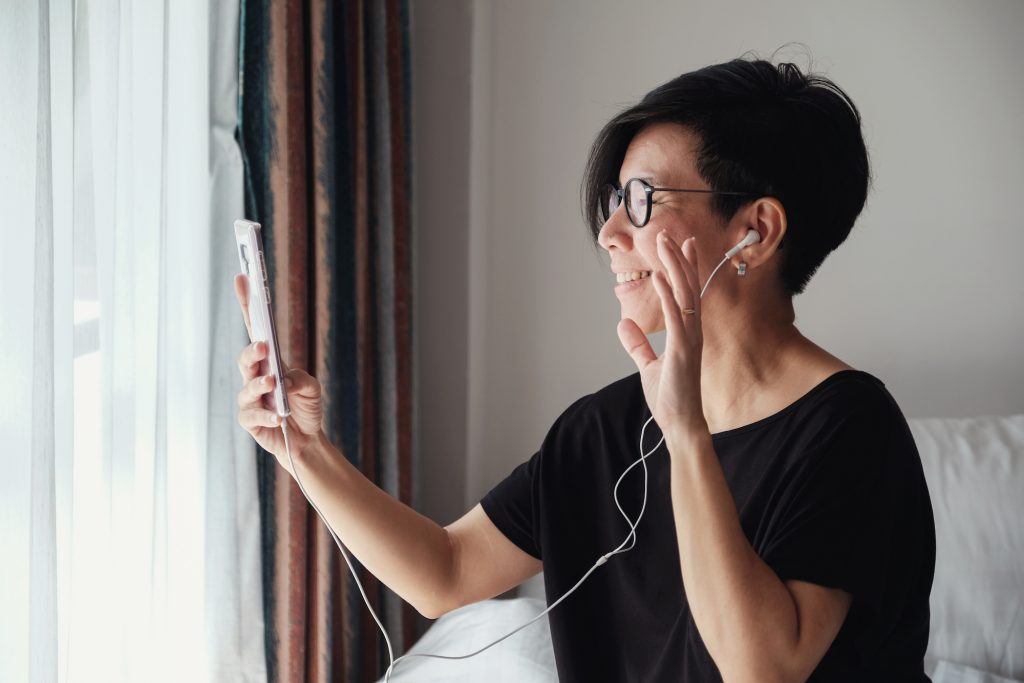The resources on this page emphasize several evidence-based self-care and coping strategies to reduce the stress associated with the COVID-19 pandemic. It is recommended to:
- stay virtually connected to loved ones through video chats, calls, texts, social media, apps, and email
- stay physically active with daily movement and exercise
- maintain regular sleep patterns and stick with routines to provide structure to your days
- eat healthy, stay hydrated, and avoid excessive consumption of sugar and alcohol
- limit exposure to distressing media
- stay informed with credible sources of information and avoid the spread of misinformation
- practice stress management techniques such as mindfulness, meditation, yoga, and controlled breathing
- try to let go of anxious thoughts about what you cannot control and instead try shifting your attention to the things that are within your control
- seek professional support as needed if you or a loved one are experiencing significant stress or impairing anxiety

COVID-19 MENTAL HEALTH RESOURCE GUIDE
- Within this section, you will find resources for coping with general stress and anxiety associated with the COVID-19 pandemic.
- Highly recommended resources are denoted with a star (★) and summarized with a brief description
- Note: all hyperlinks will open in a separate tab of your browser
Recommended Resources:
★ ADAA Coronavirus Resources (Anxiety and Depression Association of America)
Resource page updated daily with a highly extensive list of videos, articles, blog posts, general coping tools, and resources for specific populations, including: children/teens/parents, students, healthcare workers, clinicians/therapists, telementalhealth info, those who struggle with symptoms of OCD, Panic Disorder, Agoraphobia, and so on. If you’re looking for the most resources all condensed into one place, try combing through this page.
★ COVID-19 Pandemic Response Resources (Center for the Study of Traumatic Stress)
Wealth of articles and infographics for individuals, families, providers, and community leaders, with resources from national organizations such as the Center for Disease Control, Substance Abuse and Mental Health Services Administration, World Health Organization, and National Child Traumatic Stress Network.
★ FACE COVID – Ebook by Russ Harris
Afrontar el COVID (en español)
Based on Acceptance & Commitment Therapy, this 12 page Ebook presents a practical approach to safety and emotional wellbeing in the time of COVID:
- F = focusing on what’s in your control
A = acknowledging thoughts & feelings
C = coming back into your body
E = engaging in what you’re doing - C = committed action
O = opening up
V = values
I = identifying resources
D = disinfecting & distancing
★ NAMI: COVID-19 Resource & Information Guide (National Alliance on Mental Illness)
Information guide which addresses common concerns for those with mental health conditions & their loved ones, those who are quarantined and feeling isolated, those with loved ones who are elderly or at higher risk, those with a loved one who is incarcerated, those without medical insurance, those experiencing financial hardship, those who may be homeless, etc. NAMI’s guide provides helpful tips for coping and can help connect others to additional information about support services, assistance programs, housing, and mental wellbeing.
★ PTSD Coach Online (National Center for Post Traumatic Stress Disorder)
Anyone who is experiencing stress or anxiety can benefit from the tools and strategies found here. This site offers supportive tools for dealing with the following common emotional experiences: worry & anxiety, anger, sadness or hopelessness, sleep problems, trauma reminders, avoidance of stressful situations, disconnection from people, disconnection from reality, difficulty solving problems, uncertainty about direction in life.
★ COVID-19 and OCD (International OCD Foundation)
Toolkit for those struggling with symptoms of Obsessive Compulsive Disorder and their loved ones. Information and strategies for coping with the additional stress resulting from the COVID-19 pandemic, including resources for kids, teens, families, and therapists. Includes self care tools, teletherapy options, weekly discussions, and informacion en Español.
★ Coronavirus Anxiety Workbook (Jamma International)
Comprehensive workbook for managing anxiety in the context of coronavirus. This workbook utilizes Cognitive Behavioral Therapy (CBT) techniques to help the reader identify common physical & cognitive manifestations of anxiety, offering worksheets and practical tools for working with thoughts, seeking healthy distractions, building self-care routines, using gratitude practices and breathing exercises to calm the bodymind.
Further Resources
Managing Stress:
- ★ COVID-19: Stress and Coping (CDC)
- ★ Tips for Coping with the Stress of COVID-19 (Harvard TH Chan School of Public Health)
- Managing Stress Associated with the COVID-19 Virus Outbreak (VA/National Center for PTSD)
- Helpful Thinking During the Coronavirus (COVID-19) Outbreak (VA/National Center for PTSD)
- Coping with a Disaster or Traumatic Event: Taking Care of Emotional Health (CDC)
- Coping with Stress During an Infectious Disease Outbreak (SAMHSA)
- ★ Supporting the Emotional Health of Older Adults During the Pandemic (by Dr. Art Walaszek)
Tips & Tools:
- ★ Center for Healthy Minds COVID-19 Wellbeing Toolkit (UW Center for Healthy Minds)
- Coronavirus Sanity Guide (10 Percent Happier)
- ATTC Pandemic Response Resources (Addiction Technology Transfer Center Network)
Resources for those in recovery, as well as leaders, families, clinicians, tribal communities, and first responders - Tips for Providing Support to Others During the Coronavirus (COVID-19) Outbreak (VA/National Center for PTSD)
- Working Remotely During COVID-19: Your Mental Health and Well-being (APA Foundation’s Center for Workplace Mental Health, CWMH)
- Operation Health@Home
- How to Stay Active While You’re at Home (Sport England)
Browse this extensive collection of free online video programs for staying active at home: virtual fitness programs, yoga, pilates, mindfulness, strength training, and videos suitable for kids, older adults, pregnant women, and folks with disabilities or health conditions.
Additional Resources to Cope with COVID-19 Stress:
Apps for Mindfulness & Wellbeing
Try one of these mobile apps to help manage stress and promote wellbeing
Virtual Support Groups
Online support groups for individuals struggling with anxiety, depression, bipolar, addiction, and other challenges


